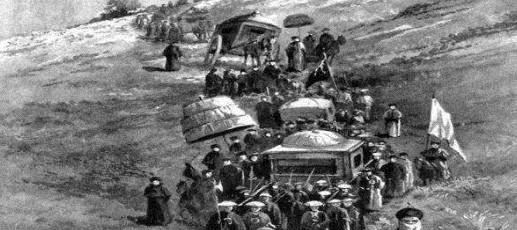In the late Qing Dynasty, because of the corruption of the late Qing government, the Western powers wantonly invaded The Chinese land, but Cixi, who was in charge of the government at that time, was greedy and afraid of death, and fled the Capital with the Guangxu Emperor after the fall of Tianjin. The officials and people of the capital saw that the emperor had fled, so they all fled from Beijing, and overnight the large city of Beijing became a borderless city.

Cixi fled west to Shanxi, and in order to entertain Cixi well, officials from Shanxi Province moved a chair from Mount Wutai, and some scholars judged the whereabouts of the Shunzhi Emperor based on this chair. Due to the urgency of the situation at that time, Cixi and Guangxu did not make a detailed escape plan, so many things happened on the road.
When the two entered Shanxi and arrived in Tianzhen County, the local officials became panicked, because at this time, tianzhen county was not only full of hungry people in the city, but even the local officials' homes did not have anything to entertain Cixi, and in a hurry, Zhixian gave the spoiled meat to Cixi to use, which caused Cixi to be angry, and Zhixian was also frightened to commit suicide. After 53 days of exile, Cixi came to Taiyuan, and the Taiyuan prefect had already prepared a palace for Cixi, although the conditions were simple, but at least there should be, and there was a dragon chair placed in the palace.
The surprised carver surprised Cixi and asked where the dragon chair came from, and the prefect replied that when he learned that the empress dowager had come in person, the minister had specially gone to Mount Wutai to transport it. Cixi did not say anything after hearing this, but only praised the loyalty of the prefect, and perhaps some people would question why there was a dragon chair hidden on Mount Wutai, but Cixi did not pay attention to it. You must know that in ancient times, only the emperor could sit on the dragon chair, but if you think about it carefully, you can think of another person, that is, Shunzhi.
According to the historical records of Shunzhi's death, there are only a dozen words, but there are many rumors about Shunzhi in the folk, and the generally accepted saying is that Shunzhi was discouraged after the death of his concubine and became a monk. In the Shunzhi period, the poet Wu Meicun wrote a poem "Qingliangshan Praise Buddha Poem", and the Qingliangshan in the poem is Wutai Mountain, which also hints at the scene of Shunzhi's monasticism. Therefore, many experts speculate that from this dragon chair and the numerous gold artifacts on Mount Wutai, it can be seen that there must always be emperors living on Mount Wutai, and this person is likely to be Shunzhi.